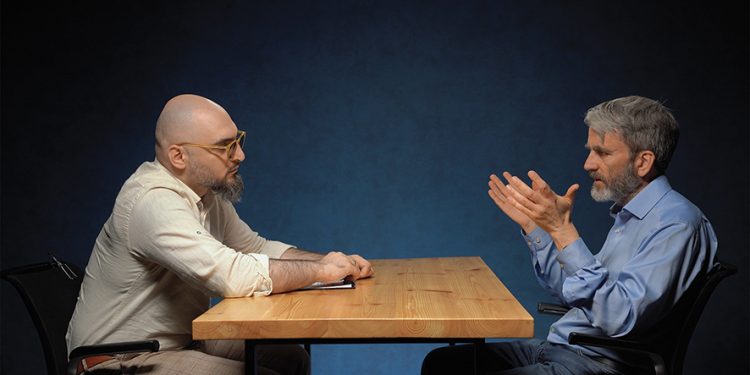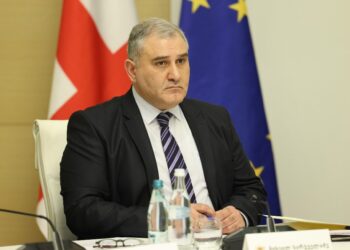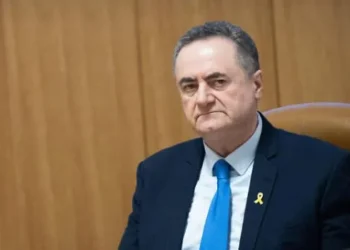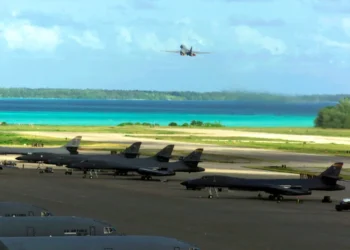Hans Gutbrod has been working in the Caucasus region since 1999, in diverse contexts with policy research and think tanks, among them Transparify, seeking to increase the transparency of policy research around the world, and as regional director of the Caucasus Research Resource Centers (CRRC). Radio Free Europe/RL’s Georgian Service sat down with him to discuss the Georgian Dream’s latest fateful game in Georgia.
“We are in a classic crisis moment in which everything is up for grabs, and how Georgia is going to develop in the next 20 years very much depends on what’s going to happen in the next 20 months,” Gutbrod tells us. “What’s at stake is the foreign policy of the country. Is this a country that is subservient to the whims of one single person, or is this a proper state?
“What’s very important is to have a core consensus, consensus on the European path, which, among other things, means that the country needs to be a proper state with proper institutions. People need to be held accountable, and we can’t have one person suddenly deciding that his personal fights with Credit Suisse or with whatever other conspiracy that he’s battling with, determine everything in the country. That’s what this is really about.”
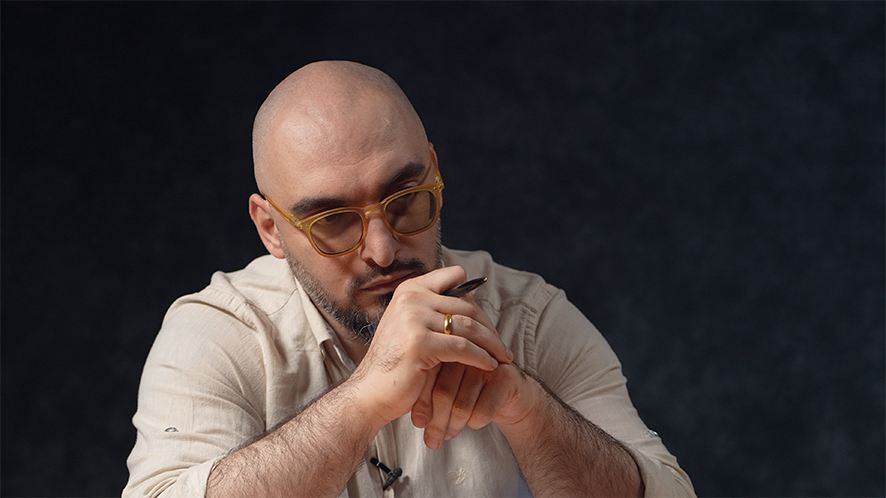
What do you think his and GD’s problem is with the NGOs? It’s not just distrust or dislike anymore; it seems to be closer to resentment, bordering on hatred.
There are ways in which Bidzina Ivanishvili is one of the most curious and remarkable figures. It would be fair to say he’s probably the loneliest man in the Caucasus, in spite of all his wealth. And if you’re that lonely, I’m not sure you can fundamentally understand the nature of reality, nor the fact that people may have different opinions, and that those opinions might be legitimate. Since NGO people happen to be among those who disagree with him, and maybe have their own ideas and even want to fight for them, he thinks they are simply out to get him. His thinking is “how could anyone object to anything I want to do?” It’s very much a cloistered and lonely environment for him- his children move abroad, he sits in his house in Shekvetili, and I think he struggles to have an appropriate sense of what’s really happening.
Georgian Dream has not only imperiled Georgia’s standing with its Western friends, but also imperiled statehood itself
In order to bring him to any sense of reality, and probably many people in Georgian Dream internally agree with this, is for him to actually take the post of Prime Minister. He’s determining everything anyway, but isn’t in any way accountable, and doesn’t actually see the consequences of his actions. I think it would almost be impossible to have any normal, structured conversation with such a person, including a structured conversation about philosophy, when that person is so far removed, and so locked in.
But it wasn’t imposed on him, that’s what he chose.
Yes. And it is a tragedy for the country of Georgia. But these are things that we find described in a very illuminating way in world literature, be it in The Great Gatsby, or in other literary figures who isolate themselves and, in the context of absolute power, having incredible wealth, end up doing incredible damage to themselves and especially to other people, and in this case, even to a country.
Let’s look at some of the narratives that GD and Ivanishvili are resorting to. One of the more prominent ones would be this “global war party”. Why do people buy into it?
I would say some people bought into it. I would say until a week ago, you could make the argument that Bidzina Ivanishvili had rather successfully balanced Georgia in this big turbulence that includes Georgia’s own situation, the war in Ukraine, the wars in Karabakh and Gaza. You could have made an argument that, “realpolitik is hard, it isn’t pretty” and that Ivanishvili, like a sort of Georgian Bismarck, understood how to keep things balanced. But then he comes out and makes statements that throw it all out of the window. You need to balance China, Russia and the West? Well, the moment you throw the West off board, you’re no longer balancing.
Bidzina Ivanishvili, for all of his many resources and the incredible talents that made him very rich, at this point is very tired
This idea that he is a wise captain in stormy seas, navigating uncharted waters, I think there were a lot of people who were willing to believe that, but then they heard that speech and suddenly saw someone who seemed obsessed with a particular vendetta, rather than with providing a course in the best interests of the country, in what is a very complicated global situation. And in this situation, it’s all the more important that one doesn’t divide the Georgian people; that one tries to bring people along. This is small country, in a challenging environment. And the entire thing that the Georgian Dream has been doing has not only imperiled Georgia’s standing with its Western friends, but also imperiled statehood itself. And this is a very, very dangerous thing.

It’s an open secret that Georgian Dream does indoor polling. Why have they chosen this moment to bring this law back and risk everything?
My personal view, and this is only my view, is that Mr. Ivanishvili is terrified of something that’s going to come out that would really damage his electoral chances. And because of that huge worry, he decided that even though the polling in general was looking relatively good, as we heard from some government members, they needed to have this headache now to avoid a much bigger headache later. I don’t know what that something is, people have various ideas what it could be, but he clearly seems to be worried that something will change people’s perception in the same way that perception was changed in 2012 with those videos coming out. So my guess would be that there’s something out there that he’s very much worried about and if he really believes that he is that vulnerable, and believes that the United States and various people are ganging up on him, then the current move makes a lot of sense.
Is there a danger that while the West is occupied with Ukraine and is trying to not let it be devoured by Russia, meanwhile, Georgia will be snatched away?
The really important thing at difficult times like these is that it becomes clear to people that it’s very unlikely that the cavalry will arrive and save the day, that the people on the outside will rush to help, and it matters that Georgia’s citizens come out; it matters that they talk to their relatives, maybe in the police, civil servants, relatives who are diplomats, and engage them and bring people along. In the end, this is a fundamental challenge, but it’s also a chance to stand up for citizenship – it’s a test, and largely a domestic one. It’s not just about courage, it’s also about having a proper and positive vision for the future. And, again, I think it’s very important to see this as something that’s plays out over 20 months, not necessarily 20 days or 20 weeks.
What reaction should we realistically expect from the West, apart from the usual condemnation? Are sanctions plausible?
For such a long time, Georgia and the West had such a good relationship. Now, for Western capitals, this is a very new paradigm, to have a government that is so directly hostile, and they need time to adjust to what this means.
What should be clear, and what Georgia’s decision makers should think about, is that if they behave like Belarus, they may at some point be treated like Belarus. They need to remember that, in the end, Mr. Ivanishvili, yes, his wealth is huge, but whether he will be able to stretch that wealth, to compensate for what turning into Belarus would bring, is worth thinking about.
What moved and motivated the people who gathered en masse to support the government on April 29th?
What moved them were the exact same minibuses that drove them to Tbilisi on December 15 to celebrate the candidate status, because those were largely the same people in the same minibuses, who came in and were told to wave the EU flag. In the end, this defines one of the huge weaknesses of the Georgian Dream: It appeals to certain voters at its core level, but, unlike Viktor Orban, unlike Vladimir Putin, this is not really a grounded political party with a long term vision or ideology. And I think, in the end, one of the reasons the government is so clearly worried and has for a long time seemed like they were feeling they’re just about to lose is because they realize that their own support is very, very thin, and it relies on transactions.
As an ex-CRRC head, and as a person who has observed every Georgian election since 1999, what do you predict of this upcoming one?
Well, predictions are classically difficult. Let’s put it this way: I think the key to success for people that want a better vision for Georgia is not to fall for divisiveness; to make clear to citizens what the fundamental choices are that this country faces. There are the whims of a single person, or, like one gentleman from Racha said, “Opposition, position – I don’t care, in the end, I want to have a state.” This is the fundamental question that this is all about: “sakhelmtsipho minda.” Should Georgia be a state that’s respectful of its citizens? That choice needs to be put out there and needs to be put out consistently, in a way that highlights that the Georgian Dream has very little positive to offer, and that Bidzina Ivanishvili, for all of his many resources and for all the incredible talents that made him very rich, at this point is very tired. He’s out of ideas, and he’s out of good people that can implement ideas. If you bring that argument in a sober and honest way, then I think even neutral voters will understand that a lot is at stake for their future and the future of their children.
Interview by Vazha Tavberidze

